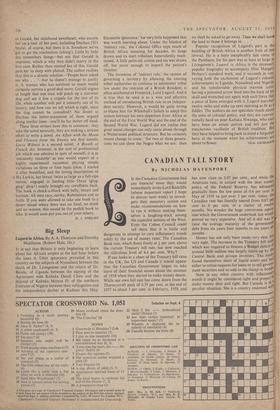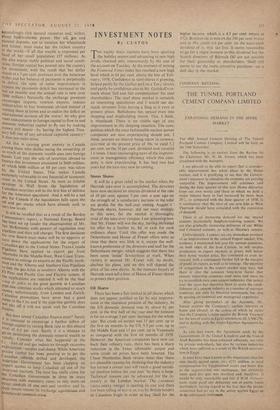CANADIAN TALL STORY
By NICHOLAS DAVENPORT If one looks at a chart of the Treasury bill rates in the UK, the US and Canada it would appear that the Canadian Government began to take leave of their financial senses about the summer of 1958 when they started to make money dearer. While our own bill rate has come down from the Thorneycroft peak of 6.59 per cent. at the end of 1957 to about 3 per cent. in February, 1959, and
has now risen to 3.47 per cent., and while the American rate, in accord with the dear moneY policy of the Federal Reserve, has advanced gradually from the low point of 0.6 per cent. in May of 1958 to just over 3 per cent. today, the Canadian rate has literally soared from 0.87 Per cent to 6 per cent. in a matter of twelve months. No wonder the huge conversion opera' tion which the Government undertook last winter proved-so very expensive. And all it did was to raise the average maturity of the government debt from six years four months to ten years 0 months. Money has not only been made very dear but very tight. The increase in the Treasury bill issue, which was required to finance a Budget deficit of around 5600 million was largely taken up by the Central Bank and private investors. The banks found themselves short of liquid assets and had either to refuse requests for loans or to sell govern' ment securities and so add to the slump in bonds' Now in any other country with inflationarY trends it might be considered right and proper to make money dear and tight. But Canada is in 4,t1 peculiar situation. She is a country endowed with astonishingly rich natural resources and, withal, cheap hydro-electric power. Her oil, gas and mineral deposits, not to mention her wheatlands a. nd timber, must make her the richest country In the world—if all this wealth is expressed per head of her small population (17 million). As she also enjoys stable political and social condi- tions, foreign capital has poured into the country for investment, with the result that her dollar stands at a 5 per cent. premium over the American d. ollar and her balance of payments is perpetually in deficit. (In spite of some improvement in exports the payments deficit has increased in the last six months and the annual rate is now over $800 million.) Naturally the exchange premium
e. ncourages imports, restricts exports, induces Industrialists to buy businesSes abroad instead of starting them at home and so makes the deficit on international account all the worse! So why give more inducements to foreign capital to flow in and domestic industrial capital to fly out by making money still dearer-----by having the highest Trea- sury bill rate of any advanced capitalist country? It does not make sense. All this is causing great anxiety in Canada among those who dislike seeing the ownership of so much of the domestic wealth pass into foreign -hands. Last year the sale of securities abroad to finance this investment amounted to $680 million. of which $600 million or 88 per cent. was taken by the United States. This makes Canada extremely vulnerable to any financial or economic crisis in the United States. As soon as trouble develops in Wall Street the liquidation of Canadian securities will be the first line of defence for the American speculator. And it will be a sad day for Canada if the liquidation falls upon the oil and gas stocks which have already sunk to very low levels.
It will be recalled that as a result of the Borden ( ommission's repot I, a National Energy Board has been set up (under the chairmanship of Mr. Ian McKinnon) with powers of regulation over Pipelines and their toll charges. The first decisions the new Board must make will be to approve or turn down the applications for the export of Canadian gas to the United States: Trans-Canada Pipelines have applied to export gas from Manitoba to the Middle-West, West Coast Trans- mission to enlarge its exports to the Pacific north- west and the Alberta and Southern Gas Pipelines _to link the gas fields in southern Alberta with the 1=1 Paso and Pacific Gas and Electric system. If the applications are rejected it will be the final ")1(P de grace to the great gamble in Canadian PIPe-line common stocks which attraoted so much ri,°neY, unfortunately, from London and Zurich. Canadian promotions have never had a good name in the City and if the pipe-line gamble does 12,°I Pay off it will not speak well for Canadian finance, tt But does sound Canadian finance exist? Surely Is. unsound to encourage a further inflow of foreign capital by raising Bank rate to this absurd level of 6.4 per cent. Surely it is a mistake to go on developing the domestic mineral wealth so rapidly, Consider what has happened in the ' Jian oil and gas industries through excessive exploitation—surplus and slump. While American private capital has been pouring in to get the Canadian oilfields drilled and developed, the American Government has been clapping on import quotas to keep Canadian oil out of the American markets. The time has really come for the Canadian Government to drop its crazy ob. session with monetary cures, to rely more on direct controls of one sort and a noi h2r. and by ,these means restore its exchange ..tquilibrium and commercial common sense.



































 Previous page
Previous page